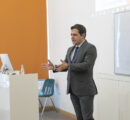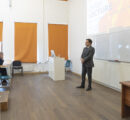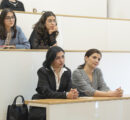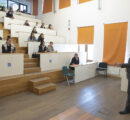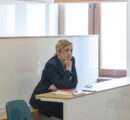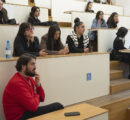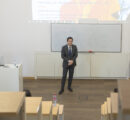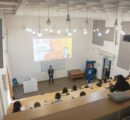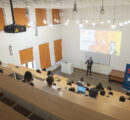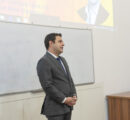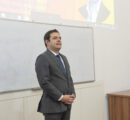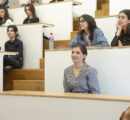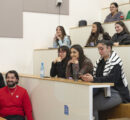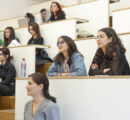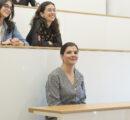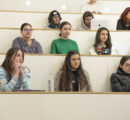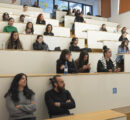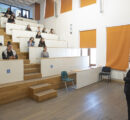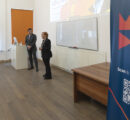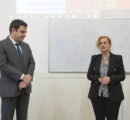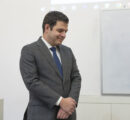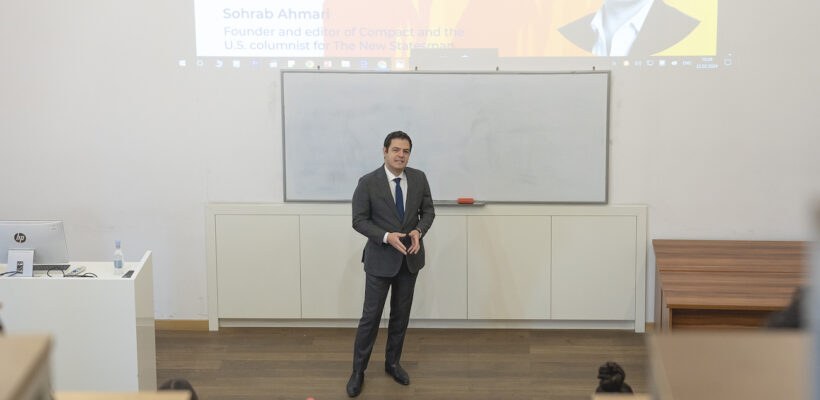
Journalist Sohrab Ahmari Delivers Lecture at AUA
3 min readYEREVAN, Armenia — On February 22, students in the American University of Armenia’s (AUA) Media and Society course taught by College of Humanities and Social Sciences Lecturer Maria Titizian attended a lecture by journalist Sohrab Ahmari, founder and editor of Compact Magazine and the U.S. columnist for The New Statesman. The event was made possible by AUA’s Media Lab and The Armenia Project.
Born in Iran, Ahmari immigrated to the United States with his family at 14. He developed an interest in journalism following the Iranian Green Movement, a passion which eventually landed him a job as a columnist and editor with the Wall Street Journal opinion pages and later as op-ed editor of the New York Post. His writing has also appeared in The New York Times, The Washington Post, The New Republic, The Atlantic, The Spectator, Chronicle of Higher Education, Times Literary Supplement, Commentary, and Dissent, among many others. Ahmari has also authored a number of books, including include Tyranny, Inc.: How Private Power Crushed American Liberty — and What To Do About It (2023) and The Unbroken Thread: Discovering the Wisdom of Tradition in an Age of Chaos (2021), both published by Penguin Random House.
After detailing his path to journalism, Ahmari delved into two central topics: the crisis of misinformation in the West — an issue which also affects Armenia — and Armenia’s struggle to tell its story on the international stage. Regarding the former subject matter, Ahmari pointed to the rise of Twitter and similar social media platforms that often disseminate decontextualized media and have become a primary source of news for the public, rather than established newspapers and magazines with strict standards and guardrails against false information.
Ahmari cited two factors that have contributed to this phenomenon. The first is the failure of mainstream institutions, which have all adopted a uniform ideology that colors their reporting and has caused them to lose the trust of a swath of the general public that does not share these views. On a more practical level, the internet has disrupted the large-scale circulation of traditional physical media, causing these organizations to struggle financially in the face of free, easy-access information that is often of questionable veracity.
As Ahmari has been writing about issues affecting the country since 2018’s Velvet Revolution, he reflected on Armenia’s effectiveness in publicizing the truth about the Nagorno-Karabakh conflict in international media, especially in the face of Azerbaijan’s extensive lobbying efforts, which have allowed the country to shape the narrative.
“Unfortunately, the September war in Artsakh received maybe 48 hours of coverage in the media,” he explained. “Now that this issue can’t be pegged to the news cycle anymore, you have to do in-depth work to refresh this topic. Now is the time to consider how you can tell the story of a relatively small country in a chaotic global environment and for an audience in a country that is enmeshed in its own domestic problems.”
Ahmari suggested a three-pronged approach to helping Armenia build institutional capacity and influence in the media landscape. He emphasized the importance of consolidating the efforts of local Armenians; affluent Diaspora communities, which, he argued, have not been mobilized to their full potential; and non-Armenian friends of the nation in systematically cultivating talent internationally and creating an ecosystem of groups working cohesively. “Sometimes, justice needs a little help,” he added.
Following the presentation, Ahmari opened the floor for questions from the audience. He fielded questions about overcoming the perception from outsiders that Armenians writing about the Artsakh conflict are inherently biased, the source of political and cultural polarization, and the future of journalism in an increasingly online world oriented toward virality and speed.
Founded in 1991, the American University of Armenia (AUA) is a private, independent university located in Yerevan, Armenia, affiliated with the University of California, and accredited by the WASC Senior College and University Commission in the United States. AUA provides local and international students with Western-style education through top-quality undergraduate and graduate degree and certificate programs, promotes research and innovation, encourages civic engagement and community service, and fosters democratic values.
About The Armenia Project: The Armenia Project (TAP) is an educational non-profit that promotes the democratic and economic development of Armenia by advancing the country’s communications ecosystem, ensuring it is robust, accurate and impactful. Through strategic programs and diverse partnerships, TAP raises global awareness about Armenia and the region.

